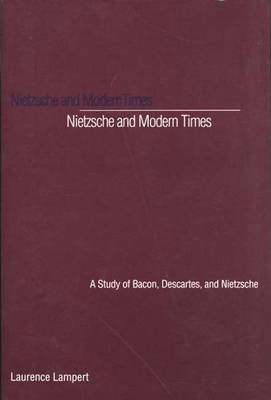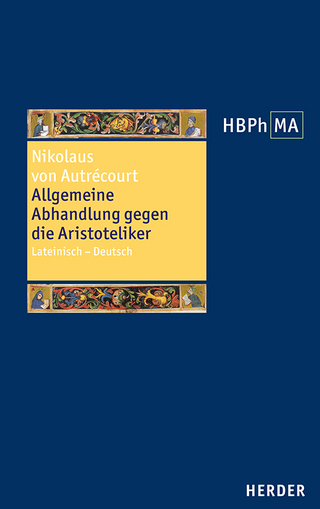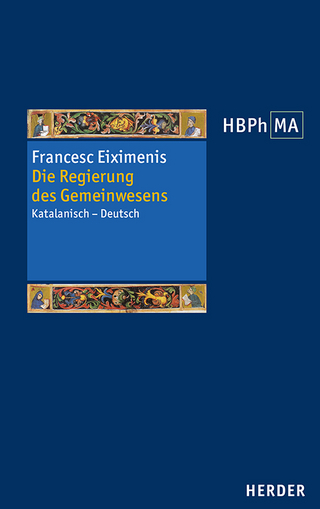
Nietzsche and Modern Times
A Study of Bacon, Descartes, and Nietzsche
Seiten
1995
Yale University Press (Verlag)
978-0-300-06510-7 (ISBN)
Yale University Press (Verlag)
978-0-300-06510-7 (ISBN)
- Titel z.Zt. nicht lieferbar
- Versandkostenfrei
- Auch auf Rechnung
- Artikel merken
Provides an interpretation of modern philosophy by developing Nietzsche's view that genuine philosophers set out to determine the direction of culture through their ideas and that they conceal the radical nature of their thought by their esoteric style.
This major work by Laurence Lampert provides a new interpretation of modern philosophy by developing Nietzsche's view that genuine philosophers set out to determine the direction of culture through their ideas and that they conceal the radical nature of their thought by their esoteric style. From this Nietzschean perspective, Francis Bacon and René Descartes can be considered the founders of modernity.
Lampert argues that Bacon's positive claims for science aimed to destroy the dominance of Christianity. Descartes continued Bacon's radical program while providing it with the mathematical physics required for its success. Far from being solely an epistemological and metaphysical thinker, says Lampert, Descartes was a master writer whose comic ridicule helped bring down the Church to which he paid lip service. Both Bacon and Descartes used the Platonic art of dissimulation to achieve their ends by making their revolutionary aims appear compatible with Christianity.
Once we recognize Bacon and Descartes as legislators of modern times in a specifically Nietzschean sense, we can also see Nietzsche in a new way—as the first thinker to have understood modern times and transcended it in a postmodern worldview. According to Lampert, Nietzsche provides a new foundation for culture, a joyous science that reveals the grandeur and purposeless play of the cosmic whole and yet avoids enervating despair or destructive, dogmatic belief.
This major work by Laurence Lampert provides a new interpretation of modern philosophy by developing Nietzsche's view that genuine philosophers set out to determine the direction of culture through their ideas and that they conceal the radical nature of their thought by their esoteric style. From this Nietzschean perspective, Francis Bacon and René Descartes can be considered the founders of modernity.
Lampert argues that Bacon's positive claims for science aimed to destroy the dominance of Christianity. Descartes continued Bacon's radical program while providing it with the mathematical physics required for its success. Far from being solely an epistemological and metaphysical thinker, says Lampert, Descartes was a master writer whose comic ridicule helped bring down the Church to which he paid lip service. Both Bacon and Descartes used the Platonic art of dissimulation to achieve their ends by making their revolutionary aims appear compatible with Christianity.
Once we recognize Bacon and Descartes as legislators of modern times in a specifically Nietzschean sense, we can also see Nietzsche in a new way—as the first thinker to have understood modern times and transcended it in a postmodern worldview. According to Lampert, Nietzsche provides a new foundation for culture, a joyous science that reveals the grandeur and purposeless play of the cosmic whole and yet avoids enervating despair or destructive, dogmatic belief.
| Erscheint lt. Verlag | 6.9.1995 |
|---|---|
| Sprache | englisch |
| Maße | 159 x 241 mm |
| Gewicht | 689 g |
| Themenwelt | Geisteswissenschaften ► Philosophie ► Philosophie des Mittelalters |
| ISBN-10 | 0-300-06510-8 / 0300065108 |
| ISBN-13 | 978-0-300-06510-7 / 9780300065107 |
| Zustand | Neuware |
| Haben Sie eine Frage zum Produkt? |
Mehr entdecken
aus dem Bereich
aus dem Bereich
Lateinisch - Deutsch
Buch | Hardcover (2024)
Herder (Verlag)
CHF 97,95
Redewendungen aus der Natur
Buch | Hardcover (2024)
Regionalia Verlag
CHF 11,10


